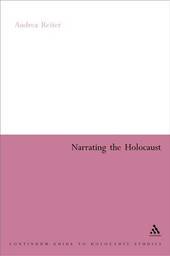
|
Narrating the Holocaust
Paperback / softback
Main Details
| Title |
Narrating the Holocaust
|
| Authors and Contributors |
By (author) Andrea Reiter
|
|
By (author) Patrick Camiller
|
| Physical Properties |
| Format:Paperback / softback | | Pages:320 | | Dimensions(mm): Height 234,Width 156 |
|
| Category/Genre | Literary studies - from c 1900 -
The Holocaust |
|---|
| ISBN/Barcode |
9780826477682
|
| Classifications | Dewey:830.9358 |
|---|
| Audience | | Tertiary Education (US: College) | | Professional & Vocational | |
|---|
|
Publishing Details |
| Publisher |
Bloomsbury Publishing PLC
|
| Imprint |
Continuum International Publishing Group Ltd.
|
| Publication Date |
1 December 2004 |
| Publication Country |
United Kingdom
|
Description
In this literary study of memoirs describing at first hand the horrors of German concentration camps, the principal question asked is: How did the survivors find the words to talk about experiences hitherto unknown, even unimaginable? Beyond being a mere analysis of discourse, Narrating the Holocaust reflects the situations in camp that triggered these responses, and shows how the professional authors adapted certain literary genres (e.g. the travel story, the Hassidic tale) to serve as models for communication, while the vast majority who were not trained as writers merely used the form of the report. A comparison between these memoirs and the more frequently discussed camp novel identifies the different narrative strategies by which the two are determined. Most of the 130 texts discussed here were published in German between l934 and the present; some famous Italian, French and Polish texts have also been included for comparison.
Author Biography
Andrea Reiter is a Research Fellow at the School of Modern Languages, Univeristy of Southampton, UK.
Reviews"Narrating the Holocaust thus offers considerable insight into texts that are not well known, particularly to English readers." - Adrienne Kertzer, The European Legacy -- Adrienne Kertzer, The European Legacy "In Narrating the Holocaust, Andrea Reiter breaks ground in two ways. First, she focuses on a wide range of testimonies written by survivors, most of which have not been available to a general, English-speaking audience, and which would not be conventionally classified as 'literature' of any sort, and subjects them to literary analysis, rather than dealing with them as historical documents. Second, she classifies these works systematically according to the different 'linguistic devices' and generic strategies that they employ." - David Brauner "Narrating the Holocaust is the kind of initiatory work that someone had to write, and for that, we should thank the author...I believe it is important that someone has been willing to treat Holocaust narratives as something other than sacred texts. To construct a means whereby we can develop a rhetorical analysis of "non-literary" texts establishes a beginning for our understanding these narratives in a context that is more than theological, historical, psychological, or philosophical. As such, this book should prove a welcome addition to the libraries of all students of Holocaust literature." - Michael J. Hoffman, H-Net Reviews, March 2002 -- Michael J. Hoffman * H' Net Review *
|